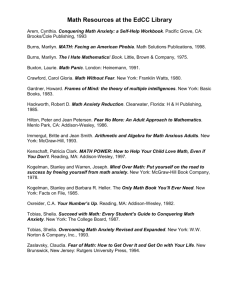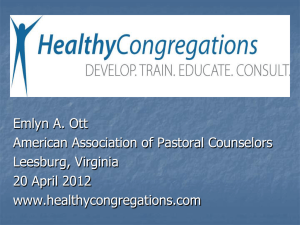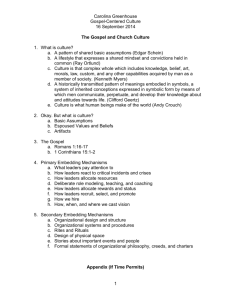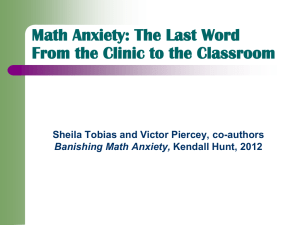Anxiety has been in the world for a long time
advertisement
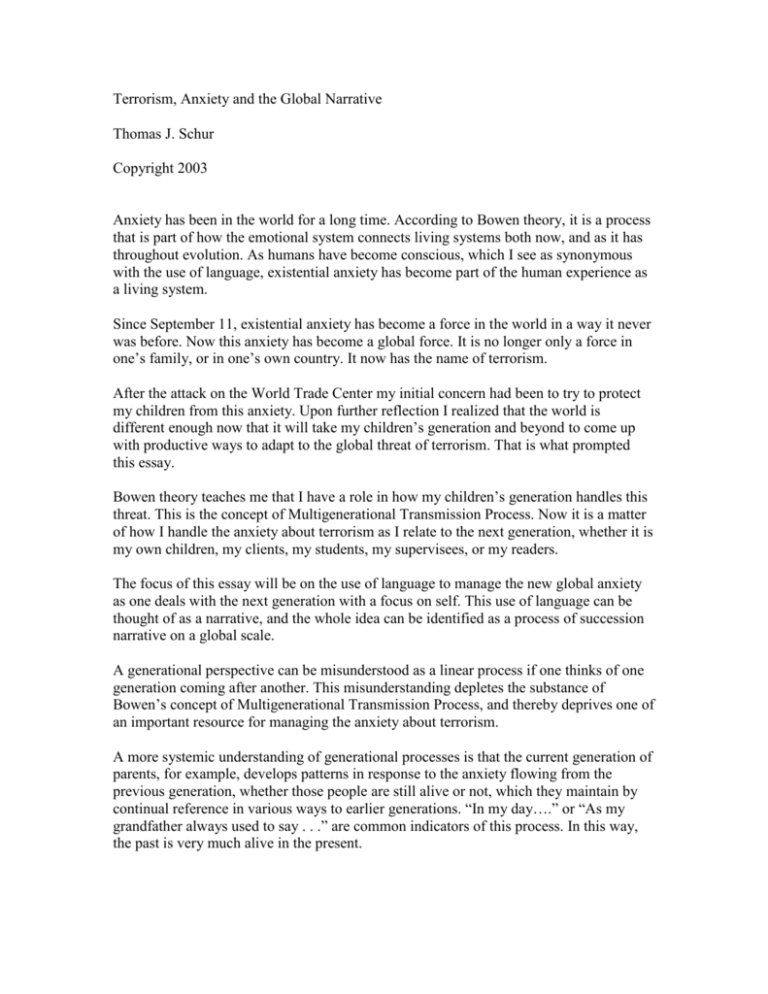
Terrorism, Anxiety and the Global Narrative Thomas J. Schur Copyright 2003 Anxiety has been in the world for a long time. According to Bowen theory, it is a process that is part of how the emotional system connects living systems both now, and as it has throughout evolution. As humans have become conscious, which I see as synonymous with the use of language, existential anxiety has become part of the human experience as a living system. Since September 11, existential anxiety has become a force in the world in a way it never was before. Now this anxiety has become a global force. It is no longer only a force in one’s family, or in one’s own country. It now has the name of terrorism. After the attack on the World Trade Center my initial concern had been to try to protect my children from this anxiety. Upon further reflection I realized that the world is different enough now that it will take my children’s generation and beyond to come up with productive ways to adapt to the global threat of terrorism. That is what prompted this essay. Bowen theory teaches me that I have a role in how my children’s generation handles this threat. This is the concept of Multigenerational Transmission Process. Now it is a matter of how I handle the anxiety about terrorism as I relate to the next generation, whether it is my own children, my clients, my students, my supervisees, or my readers. The focus of this essay will be on the use of language to manage the new global anxiety as one deals with the next generation with a focus on self. This use of language can be thought of as a narrative, and the whole idea can be identified as a process of succession narrative on a global scale. A generational perspective can be misunderstood as a linear process if one thinks of one generation coming after another. This misunderstanding depletes the substance of Bowen’s concept of Multigenerational Transmission Process, and thereby deprives one of an important resource for managing the anxiety about terrorism. A more systemic understanding of generational processes is that the current generation of parents, for example, develops patterns in response to the anxiety flowing from the previous generation, whether those people are still alive or not, which they maintain by continual reference in various ways to earlier generations. “In my day….” or “As my grandfather always used to say . . .” are common indicators of this process. In this way, the past is very much alive in the present. Then, those parents in the current generation deal with their children and the future from these patterns, and maintain them through parenting their children. “If my mother were alive and could hear you talk like that . . .” or “Your grandfather would be proud of you for . . .” are a familiar kind of phrasing that bridges the generations. So these current parents are looking back and looking forward simultaneously, as they manage the anxiety in the family system. Then, to take it to the next systemic level one can think of three generations or move alive at the same time, all doing the looking back/looking forward while they interact with each other. So each generation is also a focus for the other generations as they react to them. With this skeletal framework of multiple generations interacting recursively, I would suggest that one could see language as a structure that manifests this process. If language can be understood as a physiological process that organizes human coordination (see the essay on “Language, Systems theory and the Self” on this website) one can see how people relate to the past and the future (made possible by language), in a process of coordination with others in their family. One’s parents or grandparents do not have to be alive for the memory of them, full of associations of feelings and thoughts, to be very present in one’s current thinking and reflections with one’s self and one’s children. It seems very natural to think of this process as history, a story, a narrative. Again, the linear/systems difference comes into play if one thinks of this narrative as a linear process of history, with one event coming after another and being told to the next generation. It loses the power of the perspective of the generations interacting recursively. This is the same linear assumption when language is seen as a process of communication where one person sends a message to another. On the other hand, if one thinks that what one says to one’s self and to one’s children is a function of the dynamic balance of one’s relationship to the previous generations and to the next ones, then the process is very fluid and a person does not have an autonomous place to stand, in a reductionist sense, between generations. Whatever perspective one has, is maintained by the generational processes that one is embedded in, and will likely be part of after he or she and others have died. It is from this framework I would like to present some ideas about dealing with terrorism in this global world. First of all, the perspective about multigenerational process for families presented above, needs to be expanded to a worldwide perspective across many cultures, where this same recursive/multigenerational process has been going on in many different parts of the world for many centuries. Given this new and smaller world with the technology of travel and communication, the multigenerational process that has been specific to individual cultures now needs to be incorporated into the larger narrative of cultures across the planet as the history is shared. One can now think about a global narrative. Basically, one needs to work with the increased level of anxiety in one’s self, generated by the new phenomenon of global terrorism, with the same fundamental framework for dealing with the anxiety in one’s family that Bowen theory has developed. However, I think global terrorism adds another dimension that makes the work on self different. The difference lies in the expansion of the emotional field where the anxiety cannot be as easily managed as before with assumptions about world events not impacting one’s self that much. One still has to work to maintain grounding in self with a less reactive focus on the other. One still has to understand one’s patterns of reactivity in one’s family of origin and other systems and work to make better decisions as one sorts through feeling and thinking. But now, the existential anxiety is more difficult to manage as one realizes that the global threat probably will not be reduced in one’s own lifetime because the change is most likely not reversible, that is, that the world will not become less connected. This puts one’s own life in a different perspective in the multigenerational narrative of one’s own family, that is now more a part of the larger narrative that is global and multicultural. So how does this change affect what one has to do? Specifically, I think one has to monitor self more carefully in how one responds to world events, as one presents self in one’s family to the next generation of children, grandchildren, nieces, nephews, and to previous generations of parents, grandparents, aunt, uncles, and so on. The task is still to observe self in what one thinks, says and does, and to use one’s understanding of one’s own patterns as a guide to better (i.e. less reactive) thinking and action. A general guide would be to monitor over-reactions in terms of too much potential or too much limitation. Two extremes might be, on the one hand, to present an aggressive posture that assumes people do not have to worry because the world can fight terrorism and eliminate the anxiety. The other extreme would be to yield to the anxiety, presenting a hypervigilant posture of constantly needing to protect. So then a person getting angry and assertive in response to world events, may find it helpful to work toward a position tolerating anxiety with a sense of accepting self as less powerful as a person, a people or a country. Conversely, the person who responds with helpless and hopeless pessimism may find it helpful to work toward a position tolerating the anxiety of seeing self as more powerful as a person, a people or a country. This general guide for a direction of Potential/Limitation can lead to the specific dynamics of one’s own patterns in one’s own systems. In summary, I am proposing a way to monitor one’s reactivity to the anxiety in the emotional field, now global and existential, through the use of language in one’s family, with a specific suggestion about reactive optimism and reactive pessimism. This proposal operates on a multigenerational level and suggests the possibility of access to the global narrative as the next generations carry forth the momentum of the process of thinking and doing, for better or worse.




